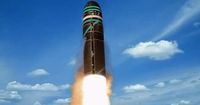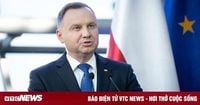On April 19, 2025, Polish President Andrzej Duda made headlines by announcing Poland's readiness to host nuclear weapons from both the United States and France. In an interview with Bloomberg, Duda emphasized that these two options are not mutually exclusive and can be pursued simultaneously. This bold statement comes amid rising security concerns in Europe, particularly following Russia's deployment of tactical nuclear weapons in Belarus.
During the interview, Duda articulated the necessity for Poland to enhance its defense capabilities in the face of "Russia's dangerous behavior." He stated, "NATO's role is to counter this behavior, and we invite you to expand the nuclear exchange program to our territory." This call for a more robust nuclear presence in Poland reflects a growing anxiety among NATO members along the eastern flank of the alliance.
In March 2025, Prime Minister Donald Tusk had already hinted at Poland's ambitions regarding nuclear capabilities, stating that the country could potentially access nuclear weapons. Tusk mentioned that he was engaged in "serious negotiations" with French President Emmanuel Macron about utilizing France's nuclear potential to safeguard European allies. This proposal has gained traction as European leaders express concern over the implications of U.S. military policy shifts under President Donald Trump.
France, which possesses approximately 300 nuclear warheads, is the only EU member with nuclear capabilities and is one of three NATO countries alongside the U.S. and the U.K. that can deploy such weapons. Macron's initiative to expand France's nuclear shield aims to bolster protection for European nations amid fears that Russia might extend its military operations beyond its borders.
However, Poland's acceptance of Macron's proposal could face hurdles. France's nuclear shield does not rely on NATO security guarantees, which complicates the situation for Warsaw. As a signatory to the Treaty on the Non-Proliferation of Nuclear Weapons, Poland has committed to not possessing nuclear weapons, which adds another layer of complexity to its nuclear ambitions.
Despite these challenges, Poland is determined to strengthen its military capabilities, with defense spending currently at 4.7% of its GDP, making it the leading NATO country in military expenditure. This investment reflects Poland's proactive approach to addressing current security risks, particularly those stemming from the ongoing conflict in Ukraine and the implications of Russia's increasing military assertiveness.
In recent years, Poland has also secured financial support from the EU to bolster its borders, particularly to counter potential security threats and manage migrant flows from Belarus, a close ally of Russia. This multifaceted strategy underscores Poland's commitment to enhancing its national security and geopolitical influence.
Additionally, President Duda has been a steadfast supporter of the Three Seas Initiative, which aims to foster cooperation among Central and Eastern European nations. This initiative seeks to strengthen infrastructure and economic ties, further solidifying Poland's role as a regional leader.
As Poland navigates its defense strategies, the backdrop of shifting U.S. foreign policy and the evolving security landscape in Europe adds urgency to its discussions about nuclear capabilities. The prospect of a "nuclear umbrella" offered by Macron to protect European nations is significant, especially in light of the potential U.S. military withdrawal from Europe.
While the discussions around nuclear weapons are fraught with political and logistical complexities, they highlight the changing dynamics of European security. The implications of Poland's pursuit of nuclear capabilities could reshape the balance of power in the region and redefine NATO's strategic posture.
As the negotiations between Poland and France progress, the outcome will likely influence not only Poland's defense strategy but also the broader security framework of Europe. The ongoing dialogue among European leaders reflects a collective acknowledgment of the need for enhanced defense measures in response to the perceived threats from Russia.
In conclusion, Poland's readiness to consider nuclear weapons from both the U.S. and France marks a pivotal moment in European security discussions. With the specter of Russian aggression looming large, the stakes have never been higher for Poland and its NATO allies. The developments in the coming months will be closely watched as they could have lasting implications for the security landscape in Europe.



